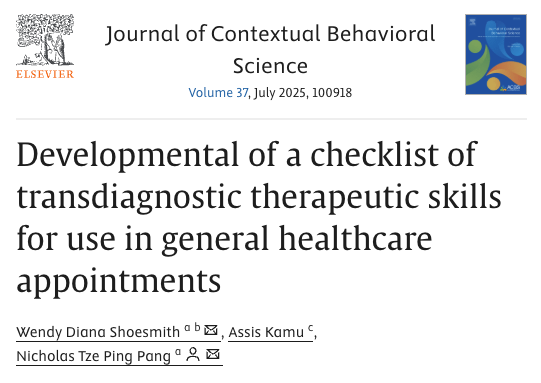Journal of Contextual Behavioral Science (JCBS)
Volume 37, July 2025
Authors
Wendy Diana Shoesmith, Assis Kamu, & Nicholas Tze Ping Pang
Key Findings
- Using very brief psychological interventions during healthcare appointments may help improve health in low resource settings.
- A list of psychological intervention skills was created that can be used by general healthcare staff in short appointments.
- The final scale was reliable, and different raters rated the skills in a similar way.
- The scale was used to show the number of skills used by primary care doctors increased following a course.
Abstract
Introduction
Psychotherapy is not available for most people globally with mental disorders. Training general healthcare staff in transdiagnostic psychological intervention skills is a more feasible approach in settings where the access to therapy is low. Tools are needed to measure the use of these skills in general healthcare settings to enable further research into effectiveness.
Methods
We operationalised skills taught in a psychological intervention course for general healthcare staff and created a 26-item observational checklist. This was validated using generalisability theory by asking five experts to rate 26 videos. Two research assistants then used the checklist to observe doctors’ consultations before and after a psychological intervention course. We used Rasch analysis to refine the checklist so that it conformed to the Rasch unidimensional measurement model. We analysed the pre-post difference in skill use, and length of appointment using linear mixed modelling.
Results
The research assistants observed 87 interviews of 12 doctors before the course and 75 interviews of 11 doctors after the course. The final 18-item checklist had a generalisability coefficient of 86.8 % and conformed to the Rasch model. There were 4.28 extra skills on the checklist used per consultation after compared to before the course (95 % CI [2.40, 6.16]). The length of appointment did not change.
Conclusion
This approach has allowed the development of a flexible checklist, which is valid, reliable and change sensitive, and can be modified and added to by other researchers according to needs. This provides a foundation for further research into effectiveness.
